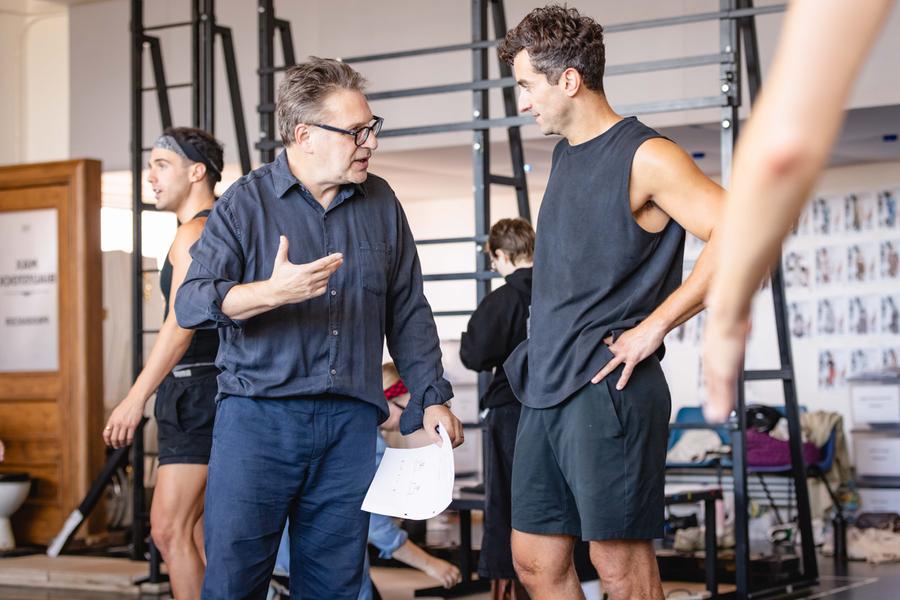Patrick Marber, the acclaimed playwright and director, has recently been in the spotlight for his unique approach to storytelling and his reflections on Jewish identity. Following the success of his production of Mel Brooks’s The Producers, which has transitioned to the West End, Marber finds himself at the intersection of art and social commentary. This musical comedy, which features a provocative theme, opened shortly after the Unite the Kingdom march in London, underscoring the relevance of satire in today’s sociopolitical climate.
In an interview, Marber remarked on the challenges of creating a work that resonates with contemporary audiences, especially in light of rising far-right sentiments. He noted that while the original film of The Producers, released in 1967, addressed serious issues, the current resurgence of antisemitism makes the material feel even more impactful today. “The film was 20 years after the end of the war,” Marber explained. “I think it would have been shocking and dangerous back then. But certainly now, with the rise of the ‘new right’ and actual swastikas in America – less so here, thank God – I didn’t have to do much to make it feel relevant and potent.”
Marber’s work often reflects his Jewish heritage, a topic he embraces openly. He humorously identifies himself as the “Jew director” of his time, a label that has emerged from both his body of work and the perceptions of producers in the industry. His previous plays, such as Howard Katz and Leopoldstadt, have explored Jewish themes and experiences, with the latter being inspired by playwright Tom Stoppard‘s personal connection to the Holocaust.
The director’s latest endeavors further solidify this exploration of identity. “I wanted to convincingly portray Max and Leo as Jews,” he stated regarding The Producers. “Whether I had Jewish actors or not, I wasn’t that bothered. I just wanted them to be Jewish characters.” He emphasized the importance of infusing Brooks’s show with a Jewish sensibility, enhancing the interactions between characters and their broader context.
As Marber reflects on his identity, he admits to a growing interest in his Jewish roots as he ages. “I’d have loved to have been able to walk these streets when they were Jewish and feel what that was like,” he said. The 60-year-old playwright attributes this introspection to the realities of aging and the contemplation of mortality. “Death,” he states, “the imminence; the contemplating of. And, well, thinking about where I want to be buried or cremated.”
The conversation naturally turned to the current state of antisemitism. Marber, who grew up in Wimbledon, acknowledged the challenges of belonging to an ethnic minority. He expressed acceptance of the societal blows and abuse that often accompany this identity. “I accept the blows that occur and the abuse,” he remarked, noting that his three sons, who are of mixed heritage, have become increasingly aware of their Jewish identity through experiences in public.
While he does not dismiss the rise of antisemitism, Marber maintains a sense of humor about the situation. “I think people have a right to hate Jews,” he quipped. “We’re really good at it, and funny about it.” This self-deprecating humor is emblematic of Jewish culture, which Marber embraces. He remarked on the unique capacity for self-mockery found in Jewish communities, contrasting it with other cultures.
Marber’s insights extend beyond individual experience to reflect on the broader implications of Jewish identity in the current social landscape. He expressed concern over actions in Gaza and the West Bank, stating, “That’s not us. That’s not what we’re supposed to be,” highlighting a disconnect between personal values and political realities.
As he continues to navigate his career in theatre, Marber remains committed to exploring these themes with authenticity. His production of The Producers is currently showing at the Garrick Theatre, where audiences are invited to engage with both the humor and the serious undertones of the narrative. Marber’s ability to blend personal reflection with social commentary positions him as a significant voice in contemporary theatre, one that resonates deeply with both Jewish identity and societal issues.
